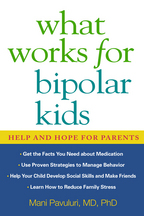What Works for Bipolar Kids
Help and Hope for Parents
Mani Pavuluri
Foreword by Susan Resko
Winner—American Journal of Nursing Book of the Year Award
“The book contains a wealth of resources, and sheds light on appropriate parenting skills, effective relationships with the child's school, types of clinicians, available medications, and much more. What Works for Bipolar Kids is a very helpful resource for parents, and is also a good addition to the mental health clinician's list of recommended books on the topic.”
—Metapsychology Online Reviews
“Finally, a book about pediatric bipolar disorder that really gets it right, offering help and hope where so much misinformation and misunderstanding have interfered with parents' getting the best for their child. Given all the confusion about diagnosis and treatment, Dr. Pavuluri's book is a godsend for parents. Her writing is warm and welcoming, and her practical wisdom and common sense leap off the page.”
—Peter S. Jensen, MD, Director, The REACH Institute
“The approach in this book has helped me achieve new stability for my son. For parents in search of help, this book will become your compass for all that lies ahead. Dr. Pavuluri’s expertise, passion, and tireless effort shine through on every page. She provides excellent information on how to manage bipolar disorder, choose and communicate with care providers, and advocate for your child in the school and health insurance arenas. The book is refreshing in its overarching sense of optimism, empathy, and support.”
—J. McCarthy, parent
“It's as if Dr. Pavuluri wrote this book for me and my family! Reading it gave me a better understanding of why my son with bipolar disorder acts the way he does, together with tools to help alleviate his pain. Throughout, Dr. Pavuluri demonstrates her understanding of these children's feelings and provides invaluable explanations and resources. This book shows parents like me that we are not alone. It is truly inspirational, and has given me new hope for my son.”
—Laurie P., parent
“Dr. Pavuluri speaks frankly to parents, but with a comforting wisdom. She compares treatment to building a house—medication management is the foundation, psychological counseling provides the bricks, and family therapy is the cement that holds it all together. This book provides a useful and encouraging blueprint.”
—Gabrielle A. Carlson, MD, Director, Child and Adolescent Psychiatry, Stony Brook University School of Medicine
“Dr. Pavuluri has seen it all—the stress on families, the frustrations in finding the right medications, the battles for support in school. This book will be a major help as you strive to make sense of your child's symptoms and the many different treatment recommendations you may receive.”
—David J. Miklowitz, PhD, author of The Bipolar Disorder Survival Guide
Table of Contents
Foreword, Susan ReskoIntroduction. Helping Your Bipolar Child: A Fresh Outlook
I. The Facts and Fundamentals: Knowing the Playground
1. Yes, Bipolar Disorder Does Occur in Children
2. Does My Child Really Have Bipolar Disorder?
3. Finding the Right Doctor and Treatment Team
II. Treatment That Can Help Your Child and Your Family: Finding the Solutions
4. Setting the Stage to Make the Most of Treatment: Principles to Get You Off to a Good Start
5. Managing Your Child’s Moods with Medication
6. Making Life Better with RAINBOW Therapy
7. Parenting with Poise: The Secret Ingredient for Success
III. Pulling It All Together into Strategies for Specific Situations: Wisdom That Gets You Centered
8. Keeping the Peace at Home
9. Finding the Best School Setting and Programs for Your Child
10. Forming a Partnership with Your Child’s Teacher
11. Building Social Skills for Positive Friendships
* A Final Word
* Appendix A. Principles for Meeting the Challenge of Bipolar Disorder
* Appendix B. Child Mania Rating Scale—Parent Version (CMRS-P)
*Appendix C. Child Mania Rating Scale—Teacher Version (CMRS-T)
* Appendix D. Medication: Tracking the History of Response
* Appendix E. Pediatric Side Effects Checklist (P-SEC)
* Appendix F. Medications Used for Bipolar Disorder in Children
* Appendix G. Daily Mood Calendar
* Appendix H. Framework for a Physician-School Teleconference
* Resources
